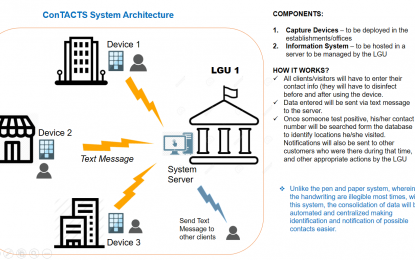
'ConTACTS'. A new system that will hasten the contact tracing efforts in Baguio City and Benguet, is being developed. The "Contact Tracing Automated Collection and Tracking System" (ConTACTS) will only require people to enter their mobile number before entering establishments, according to DOST-CAR. (Diagram courtesy of DOST-CAR)
MANILA – Most establishments these days require the public to fill out a form for health checks and contact tracing purposes. What if your handwriting is not readable? While some only require the public to scan a QR code, what if you do not have internet access or data?
This year, the "Contact Tracing Automated Collection and Tracking System (ConTACTS)" will be developed and pilot tested in Baguio City and Benguet, Department of Science and Technology - Cordillera Administrative Region (DOST-CAR) director Nancy Bantog said Tuesday.
"This is different from other contact tracing systems because of how it simplifies the process of client or visitor registration. Visitors would not need to use a pen and paper, or a smartphone for QR codes (as the device) does not require internet connection. The centralized database (will make) contact tracing more efficient since the establishments’ visitors' contact numbers and logs are in the system," Bantog told the Philippine News Agency.
She said Baguio City has an ordinance, requiring all visitors to write pertinent information on an info slip before entering an establishment.
Currently, writing using a pen and paper, and scanning a QR code are the two options to comply with the ordinance.
"The issue with pen and paper is the difficulty of reading what was written (on it), or maybe inaccurate information. QR code (on the other hand) requires a smartphone with internet connection and QR scanning capabilities," Bantog noted.
With ConTACTS, visitors will only have to input their mobile number into a device, which will be placed in pilot establishments.
A central database system will be created, and this can be accessed by contact tracers to search for the mobile number of a person who would be tested positive for coronavirus disease 2019 (Covid-19).
This will also enable the contact tracers to notify the establishments for disinfection, and alert those who may be "closed contacts" of Covid-19 positive individual.
"All the visitor has to do is enter his or her mobile number in the device," Bantog said.
Many devices will be deployed to various pilot establishments, and there will be a central server per local government unit (LGU). Pilot LGUs are yet to be identified.
"Data management will be per LGU," Bantog added.
She said the timeline for the development and deployment of this project is from January to June this year.
This is being done by the Saint Louis University, in partnership with startup form, Empitech Communication Equipment Manufacturing, and the DOST CAR which will provide a PHP200,000 financial assistance.
SLU supports the Empitech as the incubatee through the Saint Louis University Convergent Resilience Technology Business Incubator (SLU ConRes TBI), which focuses efforts on supporting startups that use modern technologies as the primary means of innovation, Bantog said.
She added that SLU assists in prototyping through the DTI FabLab, a shared service facility. The university also facilitates the acquisition of approved supplies and materials for the project.
The Empitech, meanwhile, will implement this project with the SLU and other stakeholders such as commercial establishments and the LGUs of Benguet and Baguio City.
Bantog said writing on information slips causes concerns, especially on data privacy and the ease of doing business and efficiency of contact tracing.
"ConTACTS just requires the mobile number of the visitor, which is the most important data in terms of contact tracing. The device will send the data which includes the date and time (of visit) to the central server through text message," she said.
The database will be managed by the LGU or the establishment, Bantog added. (PNA)
